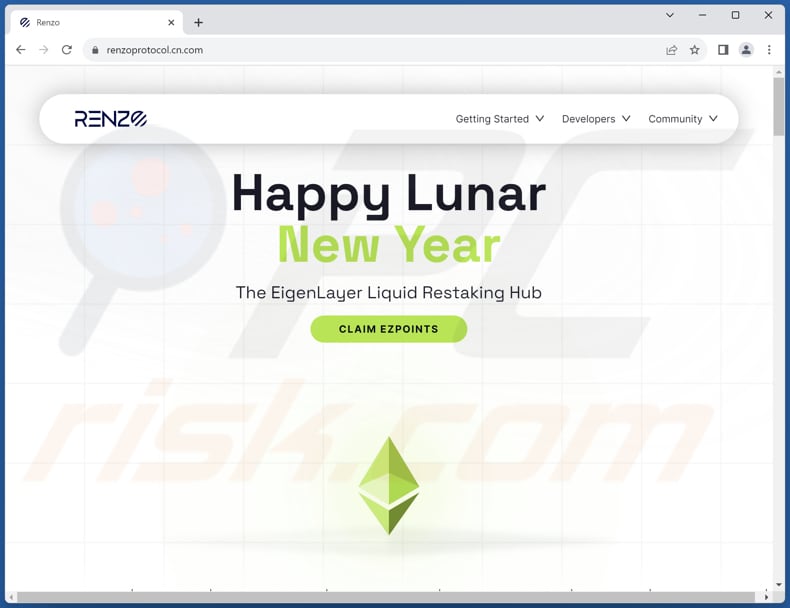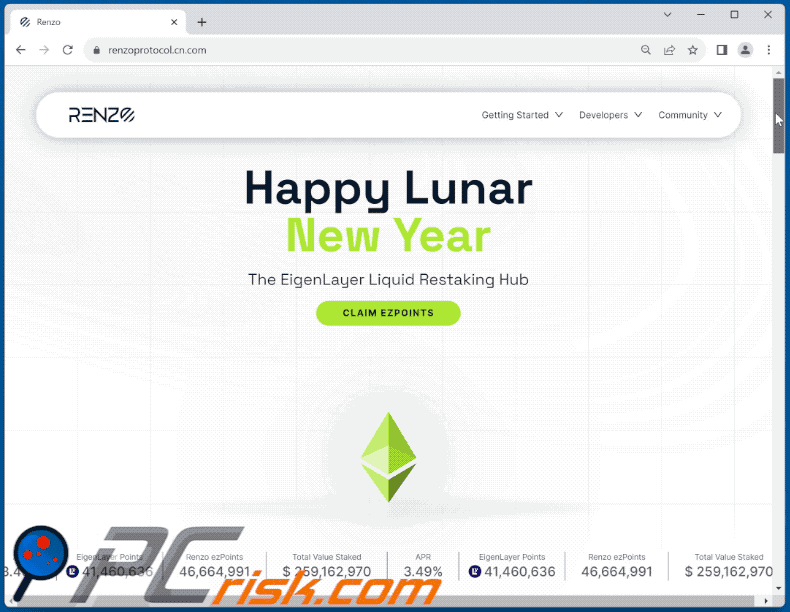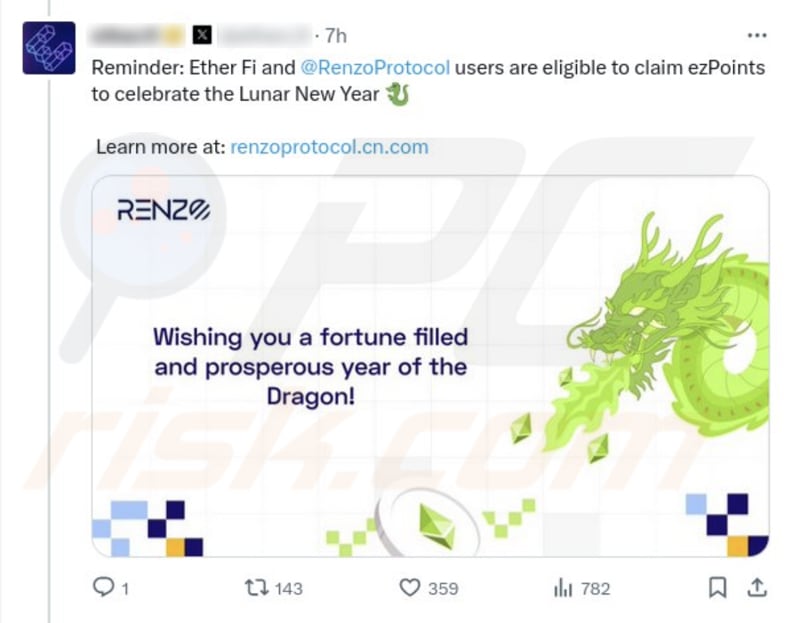How to identify fake reward programs like Claim EZPOINTS
Phishing/ScamAlso Known As: Claim EZPOINTS crypto drainer
Get free scan and check if your device is infected.
Remove it nowTo use full-featured product, you have to purchase a license for Combo Cleaner. Seven days free trial available. Combo Cleaner is owned and operated by RCS LT, the parent company of PCRisk.com.
What kind of scam is "Claim EZPOINTS"?
While examining this scheme (supposedly an ezPoints reward program), we unveiled its deceptive guise as a legitimate offer to receive ezPoints in exchange for nominal cryptocurrency deposits. The purpose of this scam is to trick unsuspecting individuals into performing certain actions leading to monetary losses.

"Claim EZPOINTS" in detail
The scam entices potential victims with enticing offers, promising them 200 ezPoints for specific cryptocurrency deposits within designated time frames. For instance, depositing 1 ETH from February 5th to 11th, at 00:00 UTC, purportedly earns 200 ezPoints per deposit. Additionally, there are similar offers for wBETH and stETH deposits, each claiming to reward 200 ezPoints per 1 deposited cryptocurrency.
These offers are designed to appear lucrative and time-sensitive, aiming to lure individuals into depositing their cryptocurrencies in exchange for the promised ezPoints. However, behind these seemingly attractive offers lies a deceitful scheme to exploit unsuspecting individuals, and promises of receiving ezPoints are merely a facade.
By adhering to the instructions outlined on the fraudulent webpage, individuals unknowingly engage in signing a malicious contract. This deceptive action triggers the activation of a crypto drainer, leading to the unauthorized transfer of their cryptocurrency funds to the scammer's wallet.
Once a malicious contract is executed or funds are sent to a scammer's wallet, reclaiming the lost funds becomes exceedingly difficult, if not entirely unattainable. Thus, it is highly recommended to be careful when engaging in crypto-related endeavors to avoid falling prey to scams and suffering financial harm.
| Name | Claim EZPOINTS crypto drainer |
| Threat Type | Phishing, Scam, Social Engineering, Fraud |
| Disguise | Legitimate ezPoints rewards program |
| Related Domain | renzoprotocol.cn[.]com |
| Detection Names | AutoShun (Malicious), Emsisoft (Phishing), Full List Of Detections (VirusTotal) |
| Symptoms | Lack of official verification, unrealistic claims, too good-to-be-true promises. |
| Distribution methods | Social media, compromised websites, rogue online pop-up ads, potentially unwanted applications. |
| Damage | Loss of sensitive private information, monetary loss, identity theft, possible malware infections. |
| Malware Removal (Windows) |
To eliminate possible malware infections, scan your computer with legitimate antivirus software. Our security researchers recommend using Combo Cleaner. Download Combo CleanerTo use full-featured product, you have to purchase a license for Combo Cleaner. 7 days free trial available. Combo Cleaner is owned and operated by RCS LT, the parent company of PCRisk.com. |
Conclusion
In conclusion, the prevalence of scams within the cryptocurrency space underscores the importance of exercising utmost caution and diligence. With the irreversible nature of crypto transactions and the absence of centralized authorities to provide recourse, individuals must remain vigilant to protect themselves from falling victim to fraudulent schemes.
By staying informed, verifying the legitimacy of offers, and adopting robust security measures, users can safeguard their assets and contribute to fostering a safer environment within the crypto community.
More examples of scams involving cryptocurrency drainers are "Layer Bank MANTA Airdrop", "Seiyans Mint", and "Blast Airdrop".
How these scams are promoted?
Scammers use various ways to entice victims into visiting deceptive websites masquerading as legitimate cryptocurrency projects. They frequently register deceptive domain names mimicking those of authentic projects.
Moreover, scammers employ methods like hijacking verified X (formerly Twitter) accounts, including those belonging to celebrities or well-known companies, to redirect users to their deceptive platforms.
Additionally, they leverage social media and search engine ads, strategically placing sponsored links above organic search results to intercept users seeking genuine crypto project websites.
How to avoid visiting scam pages?
Exercise caution when it comes to opening links in unsolicited emails, particularly those prompting urgent action or containing dubious content. Confirm the authenticity of websites by carefully verifying their URLs, ensuring they align with the official domains of reputable organizations. Furthermore, exercise prudence when encountering online advertisements and avoid clicking on deceptive or alluring promotions.
Take advantage of reputable antivirus software and ensure it remains updated, along with the operating system and other installed applications. Stay informed about prevalent online scams and phishing strategies, and maintain skepticism towards unsolicited messages, even if they seem to originate from familiar sources.
If your computer is infected with unwanted apps designed to promote scams, we recommend running a scan with Combo Cleaner Antivirus for Windows to automatically eliminate them.
The appearance of "Claim EZPOINTS" pop-up scam (GIF):

X (Twitter) post promoting this scam:

Instant automatic malware removal:
Manual threat removal might be a lengthy and complicated process that requires advanced IT skills. Combo Cleaner is a professional automatic malware removal tool that is recommended to get rid of malware. Download it by clicking the button below:
DOWNLOAD Combo CleanerBy downloading any software listed on this website you agree to our Privacy Policy and Terms of Use. To use full-featured product, you have to purchase a license for Combo Cleaner. 7 days free trial available. Combo Cleaner is owned and operated by RCS LT, the parent company of PCRisk.com.
Quick menu:
- What is Claim EZPOINTS crypto drainer?
- How to identify a pop-up scam?
- How do pop-up scams work?
- How to remove fake pop-ups?
- How to prevent fake pop-ups?
- What to do if you fell for a pop-up scam?
How to identify a pop-up scam?
Pop-up windows with various fake messages are a common type of lures cybercriminals use. They collect sensitive personal data, trick Internet users into calling fake tech support numbers, subscribe to useless online services, invest in shady cryptocurrency schemes, etc.
While in the majority of cases these pop-ups don't infect users' devices with malware, they can cause direct monetary loss or could result in identity theft.
Cybercriminals strive to create their rogue pop-up windows to look trustworthy, however, scams typically have the following characteristics:
- Spelling mistakes and non-professional images - Closely inspect the information displayed in a pop-up. Spelling mistakes and unprofessional images could be a sign of a scam.
- Sense of urgency - Countdown timer with a couple of minutes on it, asking you to enter your personal information or subscribe to some online service.
- Statements that you won something - If you haven't participated in a lottery, online competition, etc., and you see a pop-up window stating that you won.
- Computer or mobile device scan - A pop-up window that scans your device and informs of detected issues - is undoubtedly a scam; webpages cannot perform such actions.
- Exclusivity - Pop-up windows stating that only you are given secret access to a financial scheme that can quickly make you rich.
Example of a pop-up scam:

How do pop-up scams work?
Cybercriminals and deceptive marketers usually use various advertising networks, search engine poisoning techniques, and shady websites to generate traffic to their pop-ups. Users land on their online lures after clicking on fake download buttons, using a torrent website, or simply clicking on an Internet search engine result.
Based on users' location and device information, they are presented with a scam pop-up. Lures presented in such pop-ups range from get-rich-quick schemes to fake virus scans.
How to remove fake pop-ups?
In most cases, pop-up scams do not infect users' devices with malware. If you encountered a scam pop-up, simply closing it should be enough. In some cases scam, pop-ups may be hard to close; in such cases - close your Internet browser and restart it.
In extremely rare cases, you might need to reset your Internet browser. For this, use our instructions explaining how to reset Internet browser settings.
How to prevent fake pop-ups?
To prevent seeing pop-up scams, you should visit only reputable websites. Torrent, Crack, free online movie streaming, YouTube video download, and other websites of similar reputation commonly redirect Internet users to pop-up scams.
To minimize the risk of encountering pop-up scams, you should keep your Internet browsers up-to-date and use reputable anti-malware application. For this purpose, we recommend Combo Cleaner Antivirus for Windows.
What to do if you fell for a pop-up scam?
This depends on the type of scam that you fell for. Most commonly, pop-up scams try to trick users into sending money, giving away personal information, or giving access to one's device.
- If you sent money to scammers: You should contact your financial institution and explain that you were scammed. If informed promptly, there's a chance to get your money back.
- If you gave away your personal information: You should change your passwords and enable two-factor authentication in all online services that you use. Visit Federal Trade Commission to report identity theft and get personalized recovery steps.
- If you let scammers connect to your device: You should scan your computer with reputable anti-malware (we recommend Combo Cleaner Antivirus for Windows) - cyber criminals could have planted trojans, keyloggers, and other malware, don't use your computer until removing possible threats.
- Help other Internet users: report Internet scams to Federal Trade Commission.
Frequently Asked Questions (FAQ)
What is a fake cryptocurrency rewards program?
A fake cryptocurrency rewards program is a fraudulent scheme designed to deceive individuals into believing they will receive rewards or benefits in cryptocurrency in exchange for certain actions or investments. These programs typically promise enticing rewards such as free cryptocurrency tokens, airdrops, or bonuses for participating in activities like making deposits, completing tasks, or referring others.
What is the purpose of a fake crypto rewards program?
The purpose of a fake crypto rewards program is to deceive individuals into providing personal information, making deposits, or taking actions that benefit the scammer, ultimately resulting in financial loss or identity theft for the victims. The scam described in our article is created to trick users into activating a cryptocurrency drainer that siphons crypto funds from their wallets to the one owned by scammers.
Why do I encounter scam websites?
Deceptive tactics, such as phishing emails containing links, misleading social media ads, and the use of compromised or fake accounts on popular platforms, promote these scams. Users can also encounter scam websites through unreliable notifications or visiting sites affiliated with rogue advertising networks (e.g., illegal movie streaming pages and torrent sites)
Will Combo Cleaner protect me from pop-up scams?
Combo Cleaner is designed to thoroughly scan every website you visit, promptly detecting and flagging any malicious ones. This capability extends to websites hosting crypto scams, providing immediate warnings and restricting access to protect online safety.
Share:

Tomas Meskauskas
Expert security researcher, professional malware analyst
I am passionate about computer security and technology. I have an experience of over 10 years working in various companies related to computer technical issue solving and Internet security. I have been working as an author and editor for pcrisk.com since 2010. Follow me on Twitter and LinkedIn to stay informed about the latest online security threats.
PCrisk security portal is brought by a company RCS LT.
Joined forces of security researchers help educate computer users about the latest online security threats. More information about the company RCS LT.
Our malware removal guides are free. However, if you want to support us you can send us a donation.
DonatePCrisk security portal is brought by a company RCS LT.
Joined forces of security researchers help educate computer users about the latest online security threats. More information about the company RCS LT.
Our malware removal guides are free. However, if you want to support us you can send us a donation.
Donate
▼ Show Discussion